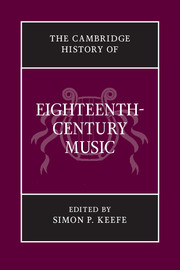Book contents
- Frontmatter
- PRELUDE
- PART I MUSIC FOR THE CHURCH
- INTERLUDE
- PART II MUSIC FOR THE THEATRE
- 8 Italian opera in the eighteenth century
- 9 Opera in Paris from Campra to Rameau
- 10 An instinct for parody and a spirit for revolution: Parisian opera, 1752–1800
- 11 German opera from Reinhard Keiser to Peter Winter
- 12 The lure of aria, procession and spectacle: opera in eighteenth-century London
- 13 Music theatre in Spain
- 14 Opera in Sweden
- INTERLUDE
- PART III MUSIC FOR THE SALON AND CONCERT ROOM
- POSTLUDE
- Appendix I Chronology
- Appendix II Institutions in major European cities
- Appendix III Personalia
- Index
- References
11 - German opera from Reinhard Keiser to Peter Winter
from PART II - MUSIC FOR THE THEATRE
Published online by Cambridge University Press: 28 March 2011
- Frontmatter
- PRELUDE
- PART I MUSIC FOR THE CHURCH
- INTERLUDE
- PART II MUSIC FOR THE THEATRE
- 8 Italian opera in the eighteenth century
- 9 Opera in Paris from Campra to Rameau
- 10 An instinct for parody and a spirit for revolution: Parisian opera, 1752–1800
- 11 German opera from Reinhard Keiser to Peter Winter
- 12 The lure of aria, procession and spectacle: opera in eighteenth-century London
- 13 Music theatre in Spain
- 14 Opera in Sweden
- INTERLUDE
- PART III MUSIC FOR THE SALON AND CONCERT ROOM
- POSTLUDE
- Appendix I Chronology
- Appendix II Institutions in major European cities
- Appendix III Personalia
- Index
- References
Summary
Neither in music historical publications nor in major compendiums or encyclopaedias do we find chapters or articles on eighteenth-century German opera. Instead, the Italian dramma per musica (later called opera seria) and the French tragédie lyrique appear as stand-ins for the serious German Baroque opera, and opera buffa, also called commedia per musica by contemporaries and later dramma giocoso, alongside opéra-comique, as designations for the lighter comic complement. There is also the German ‘Singspiel’, but is a singspiel an opera? And why does German Baroque opera, which has received substantial scholarly attention, not appear in digests of the history of opera?
These are just a few of the questions resulting from the particularities and difficulties of German opera that do not apply in the same way to Italian or French opera in the eighteenth century. We will approach very pragmatically the problem of what constitutes ‘German’ within the ‘Holy Roman Empire of German Nations’ whose Emperor was crowned in Frankfurt, resided in Vienna, was King of Bohemia and Hungary and also reigned in Upper Italy: we will include operas where at least the recitative texts were written in German and where the libretto was set by a German composer for performance on a German stage. The second problem arises from the fact that the German Empire was split into more than thirty principalities and also included several free imperial cities. Their musical life has only been partially explored thus far, making a comprehensive account at present virtually impossible.
- Type
- Chapter
- Information
- The Cambridge History of Eighteenth-Century Music , pp. 331 - 384Publisher: Cambridge University PressPrint publication year: 2009

